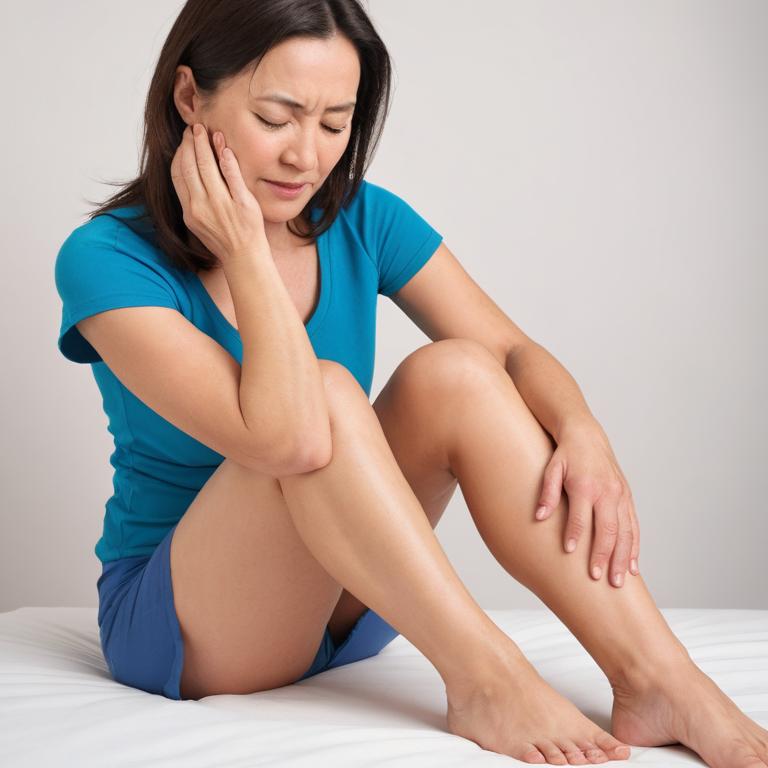Table of Contents
Natural Supplements for Menopause Joint Pain: Relief Without the Pharmaceuticals
Joint pain during menopause can significantly impact your daily life, but natural supplements may offer some relief. These supplements come in many forms and may provide a gentler alternative to traditional medications.
Many women seek out options such as herbal remedies and specific nutrients that are thought to ease inflammation and reduce pain.

With a holistic approach to managing menopause symptoms, these natural supplements can be part of a larger strategy that includes dietary changes, lifestyle adjustments, and even alternative therapies.
It’s important to consider the potential interactions and side effects, just as you would with any treatment. Your healthcare provider can offer guidance on the right combination of strategies for your unique situation.
Key Takeaways
- Natural supplements can help alleviate joint pain during menopause.
- A holistic approach may include diet, lifestyle changes, and alternative therapies.
- Consult healthcare providers for personalized treatment and to ensure safety.
- Menopausal joint pain typically decreases as women’s bodies acclimate to the changing hormone levels post-menopause.
- When the hormone imbalance is corrected, joint pain and other menopausal symptoms like vaginal dryness or high blood pressure usually resolve on their own.
- During menopause, it’s important to find ways to manage symptoms and improve quality of life.
- Cutting out sugar and processed foods can boost the benefits of an anti-inflammatory diet for joint health. Following a ketogenic diet is great for this!
Understanding Menopause and Joint Pain
Menopause can be a bit of a rollercoaster, and for many, that includes dealing with joint pain. As your estrogen levels take a dive, your joints might start to feel the impact.
It’s not just about the hot flashes and mood swings—your bones and joints are in on this too.
Here’s the deal:
- Estrogen’s drop can lead to inflammation, which might have your joints yelling for help. They might get stiff, tender, or even swollen. Not exactly a party, is it?
- It’s not all in your head. Research suggests there’s a legit connection between menopause and increased joint pain.
But wait, there’s more:
- Aging: Hey, it happens to the best of us. Your joints wear down over time, and menopause just likes to crash the party.
- Lifestyle factors: If you’re not moving as much or if you’re not watching what you eat, your joints might feel the brunt of it.
Why not give your joints a break? Consider exploring some natural supplements for menopause joint pain to ease the ache. You’re not alone in this, many women experience joint discomfort during this phase of life, and these supplements might be one way to support your body through the change.
Dietary Changes and Nutrients for Joint Health
When tackling joint pain during menopause, your diet can play a supportive role. Introducing certain nutrients and foods into your daily regimen could help manage discomfort and maintain joint health.
Omega-3 Fatty Acids
Omega-3 fatty acids, particularly those found in fish oil, are known for their anti-inflammatory properties. They can be a crucial component in reducing joint pain.
You can get your omega-3s by eating fatty oily fish like salmon, mackerel, and sardines or by taking a supplement. These essential fats have shown promise in improving joint health.
Calcium Rich Foods
Bone health is crucial during menopause, and calcium plays a vital role in that.
Make sure you’re getting enough calcium to support your bones and joints. Incorporate dairy products like milk, cheese, and yogurt, or explore plant-based sources such as tofu, almonds, and leafy green vegetables.
This assortment of calcium rich foods can help you maintain bone density and joint function.
Vitamins
- Vitamin D – assists in calcium absorption which is essential for bone health. You can get vitamin D from exposure to sunlight, but it’s also found in foods like egg yolks, fatty fish, and fortified milk. Sometimes a supplement might be necessary to reach the adequate levels that keep your bones healthy, especially if you live in a place with limited sunlight.
- Vitamin K – plays a role in supporting bone health and may help maintain bone density, which could indirectly benefit joint health.
- Vitamin C – Boost your joint health by fueling up on Vitamin C, the secret ingredient for strong cartilage and flexible joints!
Anti-Inflammatory Foods
Eating foods that have natural anti-inflammatory effects can help manage joint pain.
Think about adding turmeric, ginger, berries, and leafy greens to your diet. Also, foods rich in antioxidants, which you can find in nuts and seeds, might offer some relief.
These anti-inflammatory foods could reduce the inflammation contributing to your joint pain.
Herbal Supplements
When it comes to managing joint pain during menopause, certain herbal supplements have gained popularity for their potential anti-inflammatory and pain-relieving properties for connective tissue.
Turmeric/Curicumin
Turmeric, specifically the active compound curcumin, is known for its potent anti-inflammatory effects. This natural remedy may help reduce painful joints associated with symptoms of menopause.
For enhanced absorption, look for supplements that include black pepper extract.
Ginger
Like turmeric, ginger is another herb that might provide you with relief from sore joints thanks to its anti-inflammatory properties.
A daily dose of ginger could help diminish levels of joint pain.
Black Cohosh
Although more popular for its supposed benefits in reducing hot flashes, black cohosh may also play a role in managing menopausal joint pain for some individuals.
Be mindful of the correct dosage and consult with a healthcare provider.
Evening Primrose Oil
Evening primrose oil, rich in gamma-linolenic acid (GLA), could prove beneficial for your joint discomfort.
It’s believed that the oil’s GLA content helps lessen inflammation in your joints.
Lifestyle Adjustments for Joint Pain Relief

When tackling menopause-related joint pain, lifestyle adjustments can be as powerful as medication. Adopting certain habits can significantly ease your discomfort.
Regular Exercise
To keep your joints flexible and strong, regular exercise is key.
Consider low-impact activities like swimming, walking, or yoga, which strengthen muscles around the joints without added strain. Even daily stretches can improve your range of motion and alleviate pain.
Weight Management
Carrying excess weight puts additional pressure on your joints, especially your knees, hips, and back.
Aim for a healthy diet rich in vegetables, lean proteins, and whole grains to assist in weight management. Reducing just a few pounds can make a difference in how your joints feel.
Stress Reduction Techniques
Stress can tighten your muscles and worsen joint pain.
Implementing stress reduction techniques, such as deep breathing, meditation, or tai chi, can help you relax and may lessen the intensity of the pain you experience.
Remember, a calm mind often leads to a more comfortable body.
Alternative Therapies

If you’re navigating through menopause and grappling with joint pain, these alternative therapies might offer you some relief. Let’s explore a few that have garnered attention for their potential benefits.
Acupuncture
Acupuncture is a practice rooted in traditional Chinese medicine, where fine needles are inserted into specific points on your body.
It aims to restore energy balance and has been linked to reduction of pain, including the discomfort joint pain during menopause brings.
Massage Therapy
Massage therapy involves the manipulation of your body’s soft tissues.
It can help you ease muscle tension and improve blood circulation, which may contribute to a decrease in the joint pain you’re experiencing during menopause.
Hydrotherapy
Hydrotherapy, or water therapy, utilizes water’s therapeutic properties to soothe pain and treat various conditions.
By engaging in gentle exercises in a warm pool, you can help relieve joint stress while also improving your range of motion and flexibility.
Professional Medical Treatments
When you’re dealing with the aches of joint pain during menopause, several professional medical treatments can offer relief. Here’s a breakdown of your options.
Hormone Replacement Therapy
Hormone Replacement Therapy (HRT) can be an effective treatment for menopause-related joint pain.
HRT helps to replenish the estrogen that your body is no longer producing at the levels it once did, potentially reducing inflammation and pain.
Physical Therapy
Physical Therapy utilizes specialized exercises to strengthen the muscles around your joints, which can help alleviate pain.
A licensed therapist can also teach you pain management techniques and tailor a program just for your needs.
Prescription Medications
For more severe joint pain, your doctor might prescribe medications.
These can range from non-steroidal anti-inflammatory drugs (NSAIDs) to more advanced treatments like disease-modifying antirheumatic drugs (DMARDs) if your pain is due to an autoimmune condition.
Safety Considerations and Side Effects
When exploring natural supplements for menopause joint pain, it’s crucial to consider potential side effects and the way these supplements could interact with your current medications. Always stay informed and vigilant about how your body reacts to these changes.
Interactions with Medications
Be mindful that natural supplements can affect how your medications work.
For instance, taking turmeric might interfere with blood thinners, mimicking or amplifying their effects.
It is essential that you consult with a healthcare provider before introducing any supplement to your routine.
Monitoring Dosage and Administration
Natural doesn’t always mean harmless. It’s important to determine the right dosage for your body. This can vary based on your unique physiological factors. Overuse or incorrect administration of supplements like St. John’s Wort, known for its impact on mood, might lead to unwanted side effects.
Recognizing Adverse Reactions
Stay alert to changes in your body that could signal adverse reactions to a new supplement. Symptoms such as rashes, digestive issues, or headaches could indicate that a supplement isn’t right for you. If you notice any adverse effects, stop using the supplement and seek medical advice.
Frequently Asked Questions
When navigating the choppy waters of menopause, you might find yourself grappling with joint pain. Here, we tackle some common queries about supplements and methods that may offer relief.
What supplements help relieve muscle pain during menopause?
Omega-3 fatty acids are often recommended for their anti-inflammatory properties, which can help alleviate muscle and joint pain during menopause. You may also consider Vitamin D supplements for muscle health.
Magnesium supplements are often recommended by healthcare advisors if you are experiencing pain in your joints. Also it is important for heart health as your magnesium levels drop during menopause.
Can glucosamine ease joint pain associated with menopause?
Yes, glucosamine is commonly used to support joint health, and it may help to alleviate joint pain associated with menopause. It’s believed to contribute to cartilage formation and repair.
Is joint pain a temporary symptom of menopause or will it persist?
Joint pain can be a temporary symptom for some, while for others it may persist. It’s often due to hormonal changes, but factors like age and genetics also play a role.
What are some effective ways to treat menopause-related joint pain?
Lifestyle changes such as regular exercise, a healthy diet, and weight management can be effective. Natural supplements like turmeric may also reduce inflammation.
What type of hormone replacement therapy is recommended for alleviating menopause joint pain?
Low-dose hormone replacement therapy (HRT) can be an option for alleviating menopause joint pain, but you should discuss the risks and benefits with your healthcare provider.
How does collagen supplementation affect joint pain in menopausal women?
Collagen supplementation may help improve joint pain in menopausal women. It does this by supporting the repair of joint cartilage and reducing inflammation.

